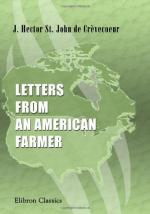LETTER X
ON SNAKES; AND ON THE HUMMING BIRD
Why would you prescribe this task; you know that what we take up ourselves seems always lighter than what is imposed on us by others. You insist on my saying something about our snakes; and in relating what I know concerning them, were it not for two singularities, the one of which I saw, and the other I received from an eye-witness, I should have but very little to observe. The southern provinces are the countries where nature has formed the greatest variety of alligators, snakes, serpents; and scorpions, from the smallest size, up to the pine barren, the largest species known here. We have but two, whose stings are mortal, which deserve to be mentioned; as for the black one, it is remarkable for nothing but its industry, agility, beauty, and the art of enticing birds by the power of its eyes. I admire it much, and never kill it, though its formidable length and appearance often get the better of the philosophy of some people, particularly of Europeans. The most dangerous one is the pilot, or copperhead; for the poison of which no remedy has yet been discovered. It bears the first name because it always precedes the rattlesnake; that is, quits its state of torpidity in the spring a week before the other. It bears the second name on account of its head being adorned with many copper-coloured spots. It lurks in rocks near the water, and is extremely active and dangerous. Let man beware of it! I have heard only of one person who was stung by a copperhead in this country. The poor wretch instantly swelled in a most dreadful manner; a multitude of spots of different hues alternately appeared and vanished, on different parts of his body; his eyes were filled with madness and rage, he cast them on all present with the most vindictive looks: he thrust out his tongue as the snakes do; he hissed through his teeth with inconceivable strength, and became an object of terror to all by-standers. To the lividness of a corpse he united the desperate force of a maniac; they hardly were able to fasten him, so as to guard themselves from his attacks; when in the space of two hours death relieved the poor wretch from his struggles, and the spectators from their apprehensions. The poison of the rattlesnake is not mortal in so short a space, and hence there is more time to procure relief; we are acquainted with several antidotes with which almost every family is provided. They are extremely inactive, and




